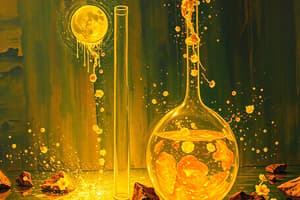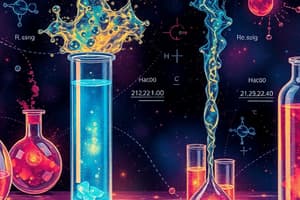Podcast
Questions and Answers
What type of reactions involve the transfer of hydrogen ions between reactants?
What type of reactions involve the transfer of hydrogen ions between reactants?
- Precipitation reactions
- Neutralization reactions
- Redox reactions
- Acid-base reactions (correct)
In an acid-base reaction, what results from the transfer of a proton from an acid to a base?
In an acid-base reaction, what results from the transfer of a proton from an acid to a base?
- Formation of a new compound and water (correct)
- Formation of a gas
- Formation of a highly reactive compound
- Formation of an insoluble precipitate
Which type of reactions involve changes in the oxidation states of elements or ions?
Which type of reactions involve changes in the oxidation states of elements or ions?
- Acid-base reactions
- Precipitation reactions
- Redox reactions (correct)
- Combustion reactions
What is the common characteristic of precipitation reactions?
What is the common characteristic of precipitation reactions?
What is the primary outcome of a redox reaction?
What is the primary outcome of a redox reaction?
Which reaction involves the formation of a precipitate due to the insolubility of the compound in water?
Which reaction involves the formation of a precipitate due to the insolubility of the compound in water?
What is a key aspect of redox reactions that ensures balance before and after the reaction?
What is a key aspect of redox reactions that ensures balance before and after the reaction?
Which element in manganese dioxide (MnO2) gains electrons during the oxidation-reduction reaction?
Which element in manganese dioxide (MnO2) gains electrons during the oxidation-reduction reaction?
In the reaction between MnO2 and HI, what is the oxidation state of hydrogen after gaining electrons?
In the reaction between MnO2 and HI, what is the oxidation state of hydrogen after gaining electrons?
What happens to oxygen in the reaction between MnO2 and HI?
What happens to oxygen in the reaction between MnO2 and HI?
Which aspect is critical in understanding how substances interact with each other and the environment?
Which aspect is critical in understanding how substances interact with each other and the environment?
Why is understanding acid-base reactions, redox reactions, and precipitation reactions important?
Why is understanding acid-base reactions, redox reactions, and precipitation reactions important?
Flashcards are hidden until you start studying
Study Notes
Chemistry Equations and Reactions
In chemistry, various types of reactions play a crucial role in understanding molecular interactions and transformations. Three primary categories of reactions are classified based on the similarity in their patterns of behavior: precipitation reactions, acid-base reactions, and redox reactions. Each category exhibits unique characteristics and mechanisms.
Precipitation Reactions
These reactions involve the formation of one or more insoluble products. They are commonly observed in situations where two or more soluble species combine to form an insoluble precipitate. For instance, when lead nitrate and potassium chloride are mixed, a precipitate of lead chloride forms due to the insolubility of the lead chloride compound in water.
Acid-Base Reactions
Acid-base reactions are characterized by the transfer of hydrogen ions between reactants. Typically, an acid transfers a proton to a base, resulting in the formation of a new compound and water. This interaction leads to an increase in the concentration of hydronium ions (H3O+) in the system. For example, the reaction between hydrochloric acid (HCl) and sodium hydroxide (NaOH) involves the transfer of H+ from HCl to NaOH to form water and sodium chloride (NaCl).
Redox Reactions
Redox reactions, also known as oxidation-reduction reactions, involve changes in the oxidation states of elements or ions. These reactions can be simplified by considering the changes in oxidation numbers for individual reactant elements. A key aspect of redox reactions is the conservation of mass and charge, ensuring that the total mass and charge remain balanced before and after the reaction.
For instance, an oxidation-reduction reaction could be the reaction between manganese dioxide (MnO2) and hydroiodic acid (HI). The manganese in MnO2 loses oxygen atoms (increasing its oxidation state) while gaining electrons, becoming manganese(IV) (+4) or lower. At the same time, the hydrogen in HI gains electrons, increasing its oxidation state to become hydrogen(I) (+1). Oxygen goes into the atmosphere as O2, and I becomes an electron deficient species (I-) or higher.
The study of chemical reactions, including acid-base, redox, and precipitation reactions, is critical in understanding how substances interact with each other and the environment. Understanding these principles helps scientists design materials, develop technologies, and model natural systems.
Studying That Suits You
Use AI to generate personalized quizzes and flashcards to suit your learning preferences.




